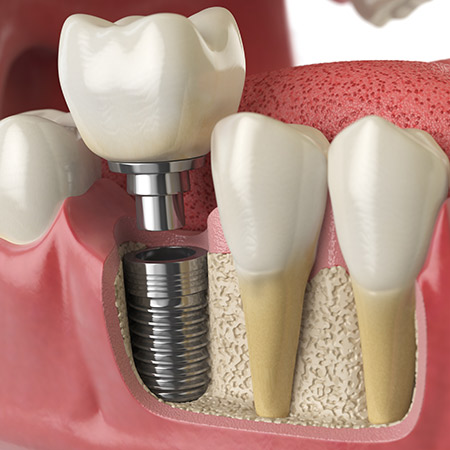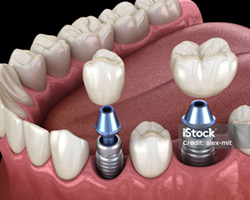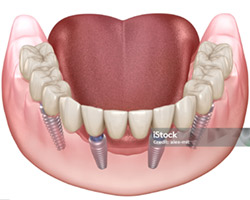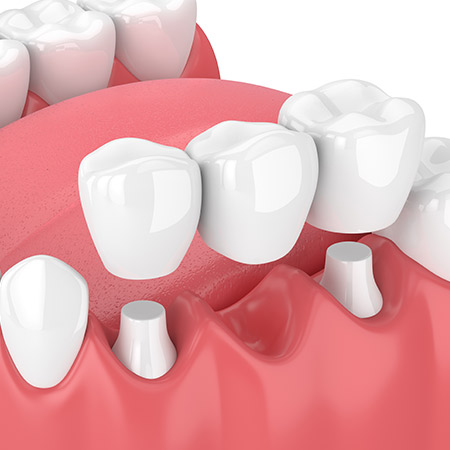Fixed
Dental Implants: A Long Term Solution for Missing Teeth
-
What Are Dental Implants?
Dental implants are a revolutionary, usually fixed and long-lasting solution for replacing missing teeth. A dental implant is a post that is surgically placed into the jawbone, acting as an artificial tooth root. Once the implant integrates with the bone (a process called osseointegration), it provides a sturdy foundation for a crown, bridge, or denture. This creates a secure, long-term replacement for missing teeth that looks and functions just like your natural teeth. Implants are made from materials like titanium or zirconia due to their durability and compatibility with the human body
Learn more about Implant Process
-
The Dental Implant Process
Getting a dental implant typically involves several stages:
-
Consultation and Planning
- Dr. Jasani will conduct a thorough examination, including X-rays and possibly a CT scan, to assess the condition of your jawbone and determine if you're a good candidate for implants.
- Dr. Jasani will discuss your treatment options, including the type of implant that will best suit your needs
-
Implant Placement Surgery
- The first step in the surgical process is the placement of the titanium implant into the jawbone. This is typically done under local anesthesia, and the procedure is relatively quick and minimally invasive.
- The gum tissue is sutured, and the implant is allowed to heal and integrate with the bone over the next several months. This process can take anywhere from 3 to 6 months.
-
Abutment Placement
- Once the implant has fully integrated with the bone, an abutment (connector) is placed on top of the implant. This will support the final restoration, such as a crown, bridge, or denture.
-
Crown or Restoration Placement
- After the abutment is placed, the final step is the placement of the custom-made crown, bridge, or denture. This restoration is designed to match the shape, size, and color of your natural teeth.
- Once the restoration is placed, your implant is fully functional and permanent, completing your smile.
-
Advantages of Dental Implants
- Durability and Longevity: Dental implants are incredibly durable and can last a lifetime with proper care. They are the best long-term solution for missing teeth.
- Natural Appearance: Implants look and feel like your natural teeth. The custom-made crowns match the color and shape of your existing teeth for a seamless, aesthetic result.
- Improved Functionality: Implants restore full function, allowing you to chew, speak, and smile confidently without worrying about slipping or discomfort.
- No Need for Adjacent Teeth: Unlike dental bridges, which rely on adjacent teeth for support, dental implants stand alone, preserving the integrity of surrounding healthy teeth.
- Improved Confidence: Implants restore the appearance of your smile, giving you more confidence in your appearance and oral health.
- Enhanced Quality of Life: With implants, you can eat, speak, and smile with ease, improving your overall quality of life.
-
Who Should Consider Dental Implants?
Dental implants are suitable for most people who are missing one or more teeth. Ideal candidates are those who:
- Have Adequate Bone Density: Implants require sufficient bone in the jaw to anchor properly. If your bone is too thin or soft, bone grafting may be necessary before implants can be placed.
- Are in Good Overall Health: Patients should be in good general health, as conditions like diabetes or uncontrolled gum disease may impact the healing process.
-
Types of Dental Implants
There are several types of dental implants, each suited for different needs, jaw structures, and tooth replacement cases. The commonly used types include
-
Single or Multiple unit Implants
This type of implant is placed to replace a single or multiple adjacent teeth which can then be restored with a crown or an implant bridge. Once implant is placed and osseointegration occurs, a post (abutment) is attached to the implant, and a crown or other prosthetic tooth is placed on top.
-
All-on- X Implants
This technique involves placing four or six implants (usually endosteal) in the upper or lower jaw, and then attaching a full set of replacement teeth which can be removable like a denture or a fixed bridge to them. It is designed patients who need a full set of teeth but may not have enough bone density for multiple individual implants.
Implant dentures and bridges are a common treatment modality and offered at Riverside Smiles.
If you're ready to restore your smile and regain full functionality with dental implants, Schedule a consultation today. Our team is here to help you explore the benefits of implants and determine if they’re the right option for you. Let us help you achieve a healthy, beautiful smile that lasts a lifetime!




